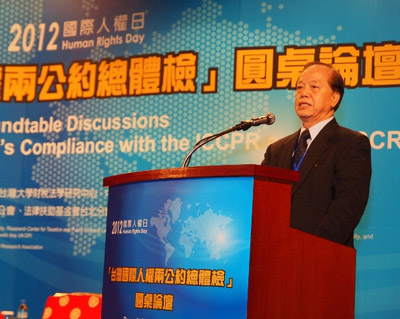 |
||||
MOF Really Fancies Itself While Reviewing Its Compliance with ICCPR and ICESCRThe two International Covenants have been adopted in Taiwan for 3 years. To boost international awareness, the government will invite international experts to conduct examinations into Taiwan 's compliance with the two Covenants in February, 2013. President Ma attended the press conference on the publication of the English version of Taiwan 's Human Rights Report and commented that the government has to accomplish 4 important tasks to be in compliance with the requirements of the Covenants. The first is to examine in great detail the local laws and regulations. The second is implement the Covenants in Taiwan with an eye to enhancing human rights protection. To identify the difficulties and challenges in the implementation is the third followed by having a human rights policy in place as the fourth. President Ma showed confidences that the government has all the tasks done in accordance with procedures. However, in a conference organized by non-governmental organizations, scholars and experts obviously have different opinions. Ministry of Finance is named as the department in most need of urgent reforms while being proud of in compliance. Despite of claims by Ministry of Finance of compliance, many tax codes and explanatory notes from the ministry have been ruled by grand judges as in violation of the constitution. Is Ministry of Finance negligent of its duty or it covers up the truth?
The Roundtable Discussion for a General Review of Taiwan 's Compliance with the ICCPR and ICESCR on the Human Rights Day, which was co-organized by 10 civil societies, was held on December 10th, 2012 . As the Chairman of the Chinese Association for Human Rights, Lawyer Su Yiu-Chen said that the General Review is not only to review the determination of the government but also to examine different governmental branch's efforts in reviewing the codes, regulations and bylaws within their jurisdictions. According to ICCPR and ICESCR, all the related laws and regulations shall be enacted, revised or abolished within 2 years after implementation, which is year 2011. Agencies of all levels shall accomplish the legislation, revision, and abolishment of codes and the improvement of administrative measures. In 2009, the Ministry of Justice (MOJ) summarized that a total of 219 codes and regulations are not in compliance with ICCPR (177) and ICESCR (42). The agencies named to be incompliant include the Office of the President, the Judicial Yuan, MOJ, the Ministry of Interior, and so on. However, the list does not include Ministry of Finance.
Nevertheless, there have been 8 tax codes or regulations judged to be violating the constitution according to the interpretation by the Justices of the Constitutional Court during June 2007-July 2009. Lawyer Su said that codes or regulations which violate the constitution will certainly violate ICCPR and ICESCR. This reveals that there must be many codes or regulations from MOF which violate their parent laws or the constitution. MOF, however, said none of its laws or regulations is incompliant with the two covenants in 2009. Lawyer Su stated that when he was a member of the Executive Yuan Human Rights Protection Committee, he has proposed a plan to enhance the human rights concepts of tax officials, and to review tax codes related with inheritance and gifting in order to protect taxpayers' human rights. The taxpayers' human rights concept has been accepted as one of the tax reform issues by MOF Financial Health Committee. Till now hundreds of articles about code and regulation revisions can still be found in the so called Release of Tax Codes webpage on MOF website. Lawyer Su invited people to investigate whether the webpage is superficial. A participant said that he found the Uniform Invoice Lottery is listed in the webpage. Is that an important issue for taxpayers' human rights? He hoped MOF should not cheat people.
Lawyer Su reported the voices of taxpayers and the suggestions of scholars and experts on the Human Rights Day. He hoped that MOF can improve taxpayers' human rights by creating the following: 1) friendly taxation for individuals and families, 2) friendly taxation for couples (Progressive tax rate for couple is a punishment for marriage.), 3) friendly taxation for labors (itemize deduction for salary income ), 4) friendly taxation for property rights (Tax due is higher than income. Forced auction is a confiscation of civilian properties.), 5) easing restriction on people's freedom of moving (16,000 tax payers are restricted from making overseas traveling for tax reasons.), 6) more emphasis on the protection of taxpayer's human rights. A friendly tax system with human rights protection will benefit taxpayers, tax agents and the government.
|
||||
|
|
|||
